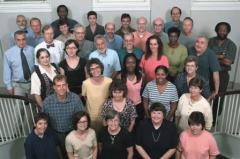|

Faculty and Staff of the Duke History Department, April 2004
|
HISTORY AT DUKE Graduate Program, Department of History, 212A Carr Building, Duke University, Durham, NC 27708-0719 Phone (919) 684-3014 Fax (919) 681-7670 Key Participants in the CID Dept. Chair, 2003-04: John Herd ThompsonDept. Chair, 2004-05: Sarah DeutschDGS for Fall 2004: Cynthia Herrup (cherrup@duke.edu)DGS for Spring 2005: Edward Balleisen (eballeis@duke.edu)CID Team Leader, 2003-04: Laura EdwardsCID Team Leader, 2004-05: Simon Partner (spartner@duke.edu)Grad Student Rep.: Tom RogersGrad Student Rep.: Marie HicksGrad Student Rep.: Kelly Kennington (kmk9@duke.edu)
Duke's Graduate Program in History
Our site includes a full description of current courses, the current
graduate student handbook, a directory of current students, and
application information.
|
|
|
DUKE'S APPROACH TO GRADUATE STUDY IN HISTORY
Over the past decade, we have, like most leading history departments,
reduced our intake of Ph.D. students. We now generally admit between 8
and 12 students a year, almost all of whom receive five years of full
funding either from Duke or outside funding agencies. We offer graduate
training in most geographic and chronological concentrations, but most
of our recent students have focused their work in Modern Europe, Modern
Latin America, the British Empire, the United States, or Military
History.
The graduate program at Duke is characterized by close relationships
between faculty and graduate students, and substantial flexibility for
students in defining a course of study, and significant participation
of graduate students in departmental governance. Graduate students
receive considerable experience in the classroom, usually having the
opportunity to lead discussion sections, direct undergraduate research
papers, and teach their own seminars and/or small lecture courses over
the course of their years in graduate school. Every year, several of
senior graduate students also teach their own courses at area colleges
and universities.
Our faculty is characterized by a tendency to integrate research
methods from other disciplines, and to pursue research agendas that
cross over traditional sub-disciplinary fields. Duke's history graduate
students often tackle similarly ambitious research topics, and have had
good success in landing tenure track positions in academia, with
numerous recent graduates gaining employment at leading research
universities and liberal arts colleges. Several of our Ph.Ds also work
for goverment agencies, non-governmental organizations, corporations,
or in public history.
Commonalities PowerPoint
Slides for a powerpoint presentation on the characteristics of our
current graduate program, given at the Jan. 2004 convening by Tom
Rogers
Key Ideas PowerPoint
Slides for a powerpoint presentation on our early proposals for reform, given at the Jan. 2004 convening by Laura Edwards
|
|
|
|
Improving Graduate Education through the CID After
a collective reconsideration of our graduate program from the ground
up, we have identified four main goals for our CID initiative: 1)
to maintain the core of our program's current flexibility, while adding
a more structured and predictable set of course experiences in the
first two years, encouraging our students to cultivate intellectual
breadth as well as depth, and involving a greater percentage of our
faculty in graduate teaching; 2)
to build more effective connections between the various formal pieces
of the program (coursework, apprenticeship in teaching, prelims, and
dissertation research/writing); 3)
to foster a more vibrant intellectual community among graduate students
and faculty, recognizing the challenges of doing so as our class sizes
have come down in the past decade; and 4)
to ensure that our graduates are prepared to thrive in the next
generation's professional environment for historians -- one that will
likely be predicated on facility with information technology,
proficiency with a variety of historical methodologies, and an ability
to speak and write to both professional and broader audiences.
|
|
|
TIMELINE OF CID DELIBERATIONS Fall 2003 Initial Discussions CID Team MeetingsGraduate Student MeetingsMeetings with Duke Professional SchoolsJan 2004 CID Convening: Brainstorming Jan-Mar 2004 CID Team development of agenda Drafting/Circulation of Draft ReportDiscussions in Exec. Committee,Department MeetingsFaculty InterviewsApril 2004 Adoption of Carnegie Report Summer 2004 Proposal of New Graduate Courses 2004-05 Implementing New Curriculum Fall 2004 (planned) CID Team Discussions: MentoringEvaluations/BenchmarksPrelimsDissertation Writing Workshop
|
|
|
|
OUR ACCOMPLISHMENTS IN 2003-04 * Extensive assessment of the graduate program and of trends in the discipline of history * Adoption of a resulting report on the graduate program (see link below), which: describes the strengths and weaknesses of the program; identifies a series of problems and a range of potential means of addressing those problems; sets out a set of specific reforms to the curriculum for the first two years of coursework; and lays out the rough outlines of an agenda for our CID deliberations in the next two years.* Highlights of the new curricular changes: a revamped sequence of two core courses, one focusing on historiography and theory, and one stressing research skills;a process for rationalizing and extending our graduate course offerings,
with an emphasis on chronological and geographic breadth, faculty
rotation, a clearer distinction between readings and research seminars,
and limits on the number of independent studies;a requirement of two research seminars in the second year, wit the resulting two research papers constituting the research component of the M.A. degree; andthe creation of a new required second-year teaching course, to assist graduate students as they begin their careers as instructors.
Innovation 1: Revamping Core Courses
This snapshot provides an overview of our reconstructed two core
courses, an introduction to historiography, and an introduction to
historical research methods.
February 2004 Report on Reforms to the Duke Graduate Program
This
report lays out our departmental CID agenda and outlining the initial
reform package adopted by the department in April, 2004
February 2004 Report, pdf version
Innovation 2: The New Curriculum for the First Two Years
|
|
|
KEY CHALLENGES, 2004-05 (and probably beyond) Implementation of the New Curriculum Launching the New Core CoursesDeveloping New Readings and Research CoursesCoordinating Course OfferingsDisseminating New Rules to Faculty and Students (creating new culture of expectations)Improving Mentoring/Assessment Benchmarks for ProgressRationalizing FeedbackGrad Student Mentors?Rethinking Prelims Guidelines for ScopePortfolio Option?Reducing No. of Fields, Increasing Breadth?Deepening Intellectual Community Writing Workshop for dissertatorsStudent-Organized Conversations?
|
|
|